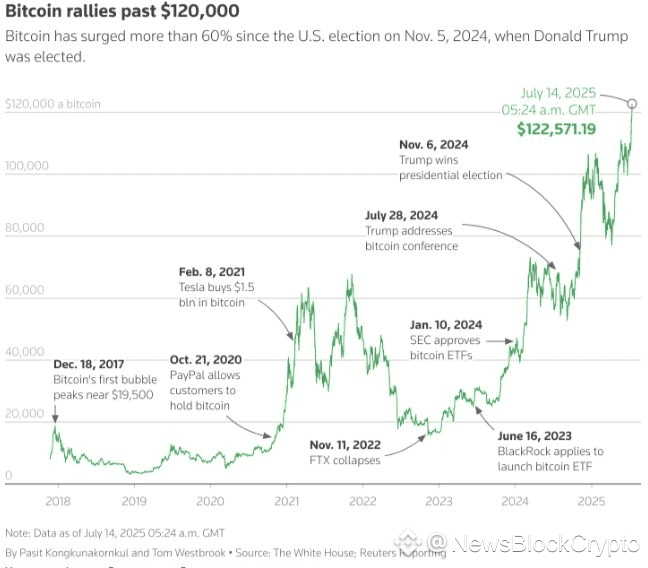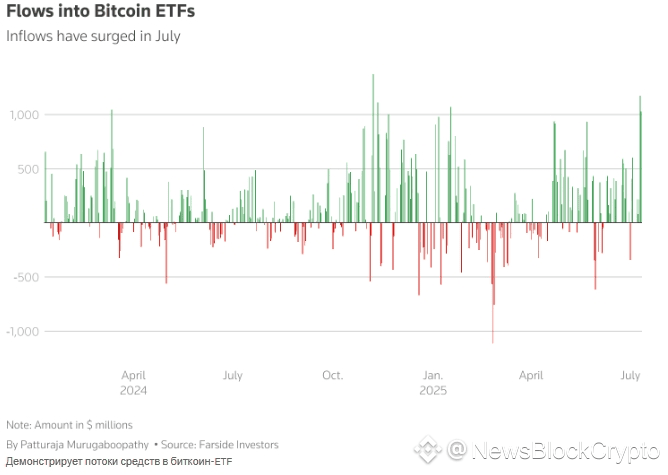Bitcoin Price Hits New Record This Week Limited Data and Opaque Wallets Make It Hard to Identify Buyers Institutional Interest Growing, But Still Tiny U.S. Politics Support Rally
Bitcoin hit a record high this week , putting renewed attention on the role of institutional investors in its rise. Analysts say their involvement is still in its early stages.
At the beginning of the week, the value of the largest cryptocurrency exceeded the $123,000 mark, which was facilitated by expectations regarding Washington's new policy on cryptocurrencies. Despite the growing interest in digital assets, analysts predict an increase in demand from institutional investors.

They believe that pension funds and other long-term investors may begin to include Bitcoin in their portfolios.
The U.S. House of Representatives passed a bill Thursday that would create a legal framework for cryptocurrency tokens pegged to the U.S. dollar, known as stablecoins. President Donald Trump is expected to sign the bill into law on Friday. The House also passed two other major cryptocurrency-related bills that will now head to the U.S. Senate.
“We’re still in the early stages of institutional ownership,” said Adrian Fritz, head of research at digital asset investment firm 21Shares, noting that retail investors still dominate cryptocurrency markets.
Fritz estimates that less than 5% of all bitcoin ETF assets are held by long-term investors such as pension funds and endowments. Another 10% to 15% are held by hedge funds or asset management firms.
However, Fritz said, much of the ETF ownership remains with retail clients because asset managers often buy these funds on behalf of wealthy retail clients.
Analytics firm Vanda believes there is a link between the surge in retail buying of cryptocurrency ETFs and crypto-related stocks and the rise in prices. Data shows that retail buyers were active in buying the assets in late 2024, when prices surged after Donald Trump won the US election, and during the recent rally.
A series of bills expected to be passed by U.S. lawmakers this week could help cryptocurrency buyers. The most significant of these, known as the “Genius Act,” would set rules for stablecoins, a fast-growing area of the cryptocurrency market.
The passage of a cryptocurrency bill by the Republican-controlled US House of Representatives paves the way for the first US federal law on digital assets.
The main intention, of course, was to bring back trash, because there is tons of trash on Everest, so that was our main motive.
Several major US lenders, including Bank of America and Citigroup, are working on launching stablecoins.

Another bill would bring regulatory clarity by formalizing definitions of digital goods and defining the roles of digital asset oversight bodies. This could make it easier for institutions that have long avoided the sector to invest in it.
Simon Forster, global co-head of digital assets at trading platform operator and data provider TP ICAP, predicts that by 2026 the number of institutions dealing with cryptocurrency will increase, including pension funds and other buy-and-hold firms.
"By definition, they're going to be the slowest (entering cryptocurrency)," Fritz said.
Buying Bitcoins Through the Treasury
Analysts say that while the data is mixed due to the opacity of crypto markets, it points to a growing role for bitcoin treasuries in driving demand.
These are publicly traded companies like Strategy and GameStop that were originally focused on retail software and video games, respectively, but are now focusing on holding and making money from Bitcoin positions on their balance sheets instead of cash, gold, or ultra-short Treasuries.
Strategy shares have risen sharply in the past year, outpacing Bitcoin's rise as many investors see it as a way to gain exposure to cryptocurrency while still investing in mainstream financial markets.
Juan Leon, a research analyst at Bitwise Asset Management, says the ability of these companies to buy bitcoin suggests they are a significant source of recent demand for the cryptocurrency. Endowment funds and hedge funds are major players in the stock and bond markets.
Strategy and GameStop did not respond to requests for comment.
Since July last year, public companies around the world have collectively increased their bitcoin holdings by 120% and now own just over 859,000, or 4%, of the 21 million bitcoins that will ever exist, according to Simon Peters, a crypto analyst at investment platform eToro.
Companies are also selling common stock, preferred stock and convertible securities to raise funds and use them to increase their bitcoin holdings in an attempt to replicate the massive rise in Strategy stock.
The new wave of US legislation could also pave the way for more listed companies to place some of their cash reserves into crypto tokens, according to Suzanne Streeter, head of finance and markets at Hargreaves Lansdown.
However, analysts warn that a drop in the Bitcoin price below $90,000 could lead to the collapse of half of corporate Treasuries.
Demand for crypto ETFs has also been growing in recent months.
Global net inflows into exchange-traded cryptocurrency products reached $4 billion last week, the highest level this year, according to crypto company Bitwise.
Major institutional investors that have disclosed their investments in crypto ETFs over the past 18 months include the Wisconsin Investment Board, Abu Dhabi sovereign wealth fund Mubadala and hedge fund Millennium Management, according to regulatory filings.
Since the start of the year, Bitcoin has gained about 25% compared to the S&P 500, which has gained 6.5%. Ether, another cryptocurrency, has gained 2%, and XRP has gained nearly 40%.
The cryptocurrency sector's market cap is currently $3.8 trillion, up nearly 66% from before the November U.S. election, according to CoinMarketCap.




